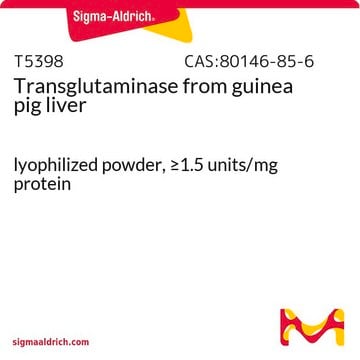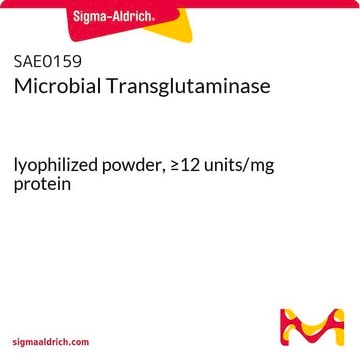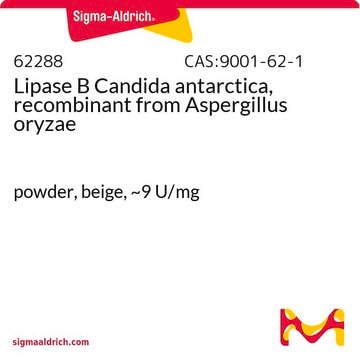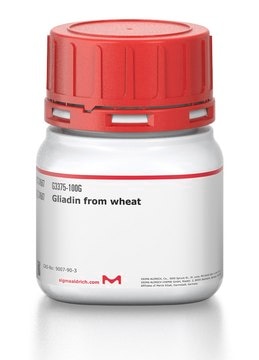T0581
Transglutaminase from guinea pig liver
≥1.5 units/mg protein, recombinant, expressed in E. coli
Synonyme(s) :
TGase
Se connecterpour consulter vos tarifs contractuels et ceux de votre entreprise/organisme
About This Item
Produits recommandés
Produit recombinant
expressed in E. coli
Niveau de qualité
Activité spécifique
≥1.5 units/mg protein
Conditions d'expédition
dry ice
Température de stockage
−20°C
Application
10 mM calcium chloride is used for activation of the enzyme.
Transglutaminase has been used in a study to improve quantifiable assays to fully characterize the role of transglutaminase in diseases such as Huntington′s disease and Alzheimer′s disease.Transglutaminase has also been used in a study to develop a nonradioactive dot blot assay for transglutaminase activity.
Définition de l'unité
One unit will catalyze the formation of 1.0 μmole of hydroxamate per minute from Nα-Z-Gln-Gly and hydroxylamine at pH 6.0 at 37 °C. (L-Glutamic acid γ-monohydroxamate is the standard.)
Forme physique
Lyophilized from 10 mM NaH2PO4, 150 mM NaCl, pH 8. Contains maltodextrin.
Mention d'avertissement
Warning
Mentions de danger
Conseils de prudence
Classification des risques
Eye Irrit. 2
Code de la classe de stockage
11 - Combustible Solids
Classe de danger pour l'eau (WGK)
WGK 3
Point d'éclair (°F)
Not applicable
Point d'éclair (°C)
Not applicable
Certificats d'analyse (COA)
Recherchez un Certificats d'analyse (COA) en saisissant le numéro de lot du produit. Les numéros de lot figurent sur l'étiquette du produit après les mots "Lot" ou "Batch".
Déjà en possession de ce produit ?
Retrouvez la documentation relative aux produits que vous avez récemment achetés dans la Bibliothèque de documents.
Les clients ont également consulté
Acyl-CoA esters of xenobiotic carboxylic acids as biochemically active intermediates.
H S Sherratt
Biochemical Society transactions, 13(5), 856-858 (1985-10-01)
K D MacDermot et al.
Developmental pharmacology and therapeutics, 3(3), 150-159 (1981-01-01)
We report investigations of benzoate and glycine metabolism and glycine acyltransferase activity in rats. These studies provide insights related to the therapy and pathophysiology of human nonketotic hyperglycinemia. Liver acyltransferase activity increased sharply postnatally from low levels at birth, but
M Kelley et al.
Journal of biochemical toxicology, 5(2), 125-135 (1990-01-01)
The aralkyl-CoA:glycine N-acyltransferase and the arylacetyl-CoA:amino acid of N-acyltransferase were purified from bovine liver mitochondria and their response to a variety of ions investigated. The activity of the aralkyl transferase was inhibited by divalent cations with all substrates investigated. For
S Kølvraa et al.
Biochemical medicine and metabolic biology, 36(1), 98-105 (1986-08-01)
Prompted by the fact that the urinary excretion of organic acids in the riboflavin-deficient rat closely mimics that found in patients with inborn errors in the acyl-CoA dehydrogenation systems, the organelle localization and the apparent kinetic constants (Km and Vmax
C M Becker et al.
Archives of biochemistry and biophysics, 223(2), 381-392 (1983-06-01)
Valproic acid (dipropylacetic acid), an antiepileptic agent known to be hepatotoxic in some patients, caused inhibition of lactate gluconeogenesis, fatty acid oxidation, and fatty acid synthesis by isolated hepatocytes. The latter process was the most sensitive to valproic acid, 50%
Notre équipe de scientifiques dispose d'une expérience dans tous les secteurs de la recherche, notamment en sciences de la vie, science des matériaux, synthèse chimique, chromatographie, analyse et dans de nombreux autres domaines..
Contacter notre Service technique











